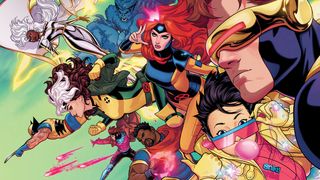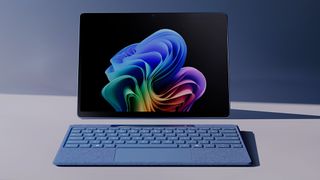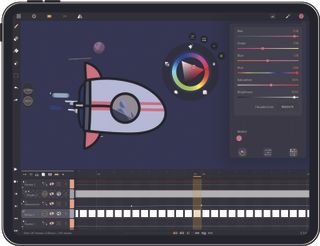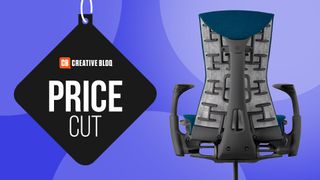Marvel artist Russell Dauterman has spent ten years drawing some of comic's most popular heroes in The Mighty Thor, X-Men and Scarlet Witch. Now he's collected his most memorable illustrations and artworks into a new book, The Marvel Art of Russell Dauterman.
The new coffee table 'boutique' art book from Clover Press (the publisher behind Craig Yoe's new book) and Marvel Comics is the latest release from the publisher and presents iconic images alongside rare and never-before-seen artwork from one of comic's best known artists. In my interview below Russell reveals his love of drawing digitally (read our guide for the best digital art software).
The Marvel Art of Russell Dauterman is being launched on Kickstarter from today, and fans can opt in for a number of collectible bundles, including a 1,000 piece Women of Marvel puzzle, Hellfire Gala and X-Men 24 x 36-inch posters, an X-Men trading cards set as well as the 216-page 9 x 12-inch high end coffee table book and five swish 11 x 17-inch prints. Naturally, the book features a new cover illustration from Russell.
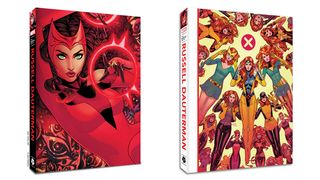
The Art of Russell Dauterman is the latest in Clover Press' 'Marvel Art of…' series that also includes The Marvel Art of David Mack, The Marvel Art of Alex Maleev and The Marvel Art of David Nakayama - all of which can be added to your bundle if you support the Marvel Art of Russell Dauterman Kickstarter.
Below I chat to Russell about his career, his big break and how new technology has enabled him to "experiment" more - he has an aversion to 'messing up' his art so drawing digitally means he can overcome any paint splash anxiety.
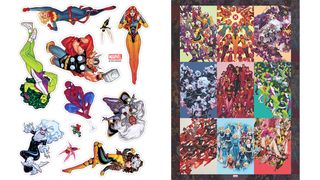
Could you share some insights into your creative process and how you developed your distinctive style?
I think my style started developing when I was a little kid and first saw Batman Returns, X-Men: The Animated Series, and Gargoyles, and started reading X-Men comics. Those things formed how I draw and what I love to draw.
As I got older and worked to become a comic book artist, I took in more influences and it all melds together. And I think that process is ongoing. I’m putting together this book of a decade of my Marvel Comics artwork, and I was looking at my first published work where my style is a little different – wondering if I should go back to that! Style is an ever evolving thing.
Is there a particular character or series that you found especially inspiring or challenging to illustrate?
Jean Grey, Scarlet Witch, and Storm are my all-time favourite characters – getting to draw them at all was huge for me! I was thrilled to design their current superhero outfits in the comics – that was a total dream-come-true and definitely a challenge.
I looked at all their past costumes, and took the bits that I thought were most iconic or interesting – the things that would make a reader instantly recognise them, like Wanda’s crown – and I tried to synthesise those things with new elements to make designs that were fresh and modern.
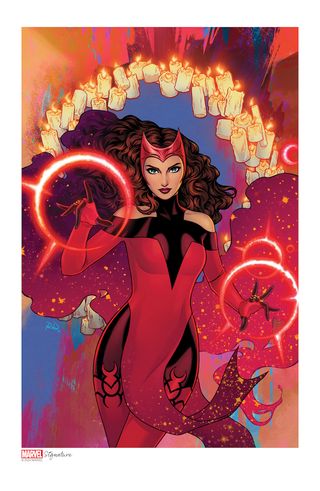
With the evolution of technology and digital tools, how has your approach to creating comic book art changed over the years?
I’ve drawn completely digitally for my whole time at Marvel. I draw with a Wacom stylus on a tablet for rough drawing and on a Cintiq for polished drawing and colouring. I’m someone who likes to erase, so digital is perfect for me.
In school, I would always be too nervous to splatter paint on my art, even though that was the look I wanted, afraid I’d ruin the piece! But digitally, I can experiment and do all sorts of effects that, if I don’t like them, I can just delete that bit and try again.
What has been the most challenging side of being a comic artist?
Working on such a tight turnaround has been challenging – I’m a pretty meticulous person and that’s not super conducive to drawing a comic quickly, which is usually required. I’ve been very thankful in recent years to work mostly as a cover artist on books like X-Men and Scarlet Witch, where I get to take more time on each piece.
What advice do you have for new artists who want to get into comics?
I broke into comics by doing portfolio reviews at comic book conventions. Most publishers do formal portfolio reviews at cons – that was invaluable for me to get feedback to help my work improve, and to meet editors (some of whom eventually hired me!).
After my first positive Marvel review, I naively thought I’d be hired immediately. That didn’t happen, and I needed to improve a lot. But I kept in touch with the editor I had the review with, sending him new samples, and a few years later, he hired me for my first Marvel job – drawing a Cyclops series.
My advice would be to learn drawing fundamentals, to practice drawing people, facial expressions, anatomy, buildings, perspective, inanimate objects, etc. Drawing comics encompasses a lot of different disciplines – sequential art and storytelling, costume and set design, graphic design and composition.
Having a grasp of the fundamentals should give you a foundation to explore all of those disciplines, without hitting roadblocks on basic drawing. And with all that practice, you can put together a portfolio of the work you want to do – which you can take to cons, if possible, and share online.
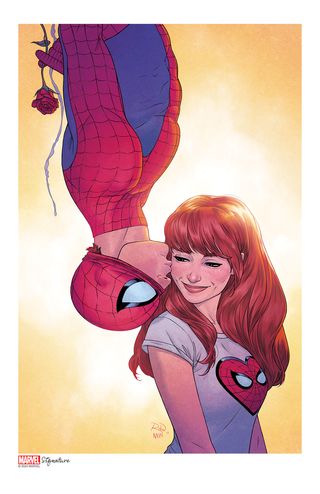
If you want to follow in the footsteps of Russell Dauterman and get into drawing comics, read some of our Procreate tutorials and find your ideal tablet in our best drawing tablets guide.
Get the Creative Bloq Newsletter
Daily design news, reviews, how-tos and more, as picked by the editors.
